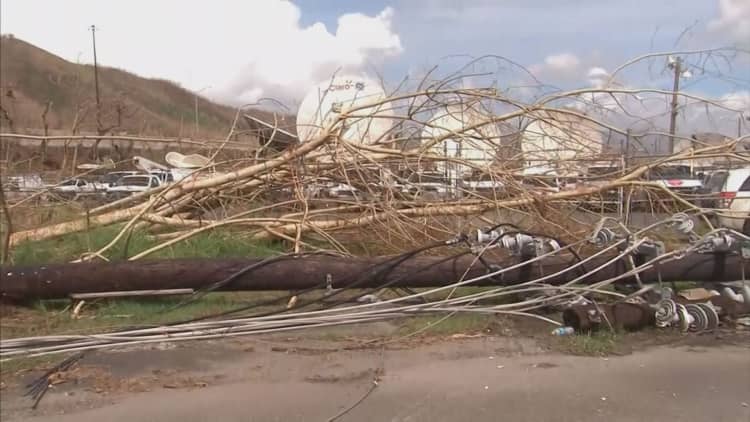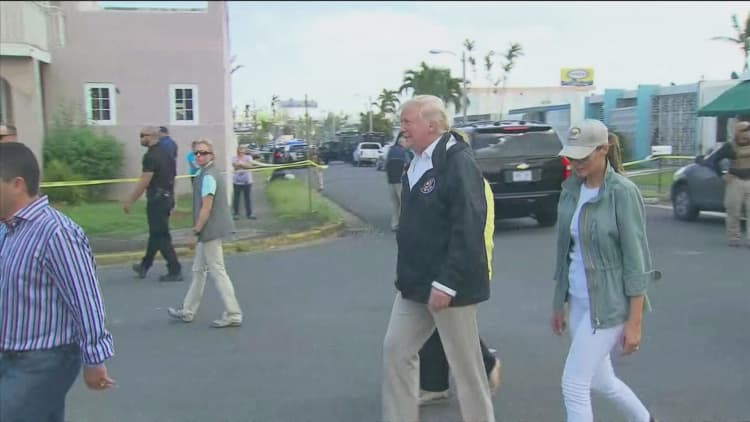
Ahead of President Donald Trump's arrival in Puerto Rico on Tuesday, CNBC reporter Contessa Brewer and her team ventured deep into the devastated island's countryside over the weekend to get a first-person view of how its citizens are faring. Here's her eye-opening account:
Clogging the supply chain
I knew my photographer was worried. His sister lives alone, in their childhood home, outside Caguas. He had heard nothing from her since before Hurricane Maria hit. But when we landed in San Juan, Puerto Rico, our team's immediate focus was on a broken supply chain that was prolonging the life-or-death crisis for families across this island of 3.4 million people.
Jose "Pache" Ayala, Crowley Maritime's vice president in Puerto Rico, gazed out over the container and liner shipping services' terminal and described thousands of cargo containers clogging the yard. It was over capacity, and the terminal was running out of space to place containers — at the same time more ships were in line waiting to unload.
Though government officials quibbled about the number of containers stuck in the terminal, Ayala insisted the Federal Emergency Management Agency was not factoring in the thousands of commercial containers with nonessential cargo that were blocking the supply chain.
Begging for food and water
Inside the Nestle Toll House Cafe, I met Mario Salazar, the CEO of the tech company Blockfinity/Databay, based in New York City. He'd flown down to check on his family, loading his rental vehicle with supplies. When he reached his sister, she embraced him and said, "I want to talk to you, but I'm so hungry."
Mario gave her food and water and watched tears roll down her face as she gulped it down. Mario, a former Marine, told me, "We are a family with resources. If my sister is going through this, what about others?" He described pregnant women and children chasing his car, believing he was with FEMA, begging for food and water.
Detroit firefighter Hector Martinez flew down with supplies for his family. Once they were taken care of, he drove back to San Juan, bought more supplies at Walgreen's and planned his return trip to distribute more in areas where no one had seen any FEMA personnel 10 days after the storm.
Martinez texted me, "I met a couple paramedics. They say Rincon hasn't seen any relief and people are dying."
'Worried about our employees'
Victor Calderin — my photographer and a native Puerto Rican — quietly worried. The stories we heard from those who'd traveled the island greatly concerned him. Our team strategized about the logistics of driving the island — how we could refuel and still cover more ground. Could we lay out a trip that took us to his sister's town?
On Saturday we left our hotel at 6:30 a.m. local time to be at the Trailer Bridge terminal at the port when it opened at 7 a.m. I hopped in with a trucker named Melvin who went to pick up a cargo container inside — we drove by rows of containers, with no luck spotting it. Melvin said, "It's a normal route for him. ... He knew where it was supposed to be."
Melvin headed back to the office to try to figure out where to find the container. Turned out, in the post-hurricane confusion, the container was located at another terminal. What was supposed to be a 10-minute pickup and delivery to Plaza Provision, which distributes food to Wal-Mart, Sam's Club, Costco, and many other stores, turned into a two-hour trip.
Melvin's working long days. I noticed clean clothes and toiletries stashed in his cab. A messed-up mission makes it longer. Melvin shrugged and said: "Sometimes, it happens."
Plaza Provision's warehouse is a hive of activity. They're working on generator power, with unreliable diesel deliveries. As soon as I began chatting with the company's CEO, Robert Cimino, he began crying and stepped behind a cargo container. I gently pressed him, and he said, "So many of our people are unaccounted for," he said. "We're focused on logistics and moving these supplies, but it's so hard to do it when we're worried about our employees."
Pat Foley, CEO of Lufthansa Technik Puerto Rico, has similar concerns. He heads a group of nearly 400 employees. At the facility, there's no running water, bathrooms aren't operating, and the only power comes from a generator. And that's not enough to open the massive hangar door, so Lufthansa employees used combined muscle to push it out of the way. They need the space inside for the 80 tons of water, food, clothing and basic supplies Lufthansa sent from Frankfurt. As the plane pulled up, employees began cheering. Their relief was palpable. Foley told me he and his company have a clear priority: People first.
After we left the airport, we stopped at a bakery selling freshly baked baguettes and croissants and hot coffee. The tiny dining area was packed. As we waited for our first hot breakfast on the island since the storm, I talked to Creighton Skeen, an agent with U.S. Customs and Border Protection. Skeen says they've been landing wherever they can, picking up patients with pre-existing conditions and flying them to hospitals in San Juan.
Putrid smell of rotting flesh
Near the southwestern town of Yauco, we saw fields of plantains entirely decimated. Mango groves bowled over by the wind and looming above us — those formerly lush tropical forests covering mountains, now brown, barren, stripped of signs of life.
On the highway, utility trucks were parked on the shoulder or in the median, buckets raised high with workers tackling dangling electrical wires and cables. We saw mile after mile of sagging electrical lines and telephone poles snapped in half or leaning precariously over roadways and intersections.
Near Ponce, my producer noticed a cell phone tower with its white rectangular transmitters drooping like a wilted flower. We pulled off the highway to take a picture and stretch our legs, joining other drivers with the same thought. The putrid smell of rotting flesh overwhelmed me. I couldn't see the source of the foul odor, but that scent occasionally would assault me along our drive throughout Puerto Rico.
As we drove south from Aguadilla, we saw the ruins of the island's oldest lighthouse. As the ocean waves crashed and the breeze carried in the smell of salt, the only signs of visible damage from the storm were downed trees and the brown hillsides in the distance. I watched surfers unload their boards and head toward the water. I stopped in the dunes to pick a wildflower and immediately ants swarmed my feet and attacked.
I carry a well-provisioned first aid kit with me to disaster zones, but the one thing I'm missing is Benadryl. We found a tiny drugstore, open, cash-only to buy the over-the-counter medication. The pharmacist offered me a stronger dose, but I declined.
We turned off the perimeter highway, following Highway 52 through the mountains in the central part of Puerto Rico. A massive crowd of cars clustered around a highway intersection in Cayey — it was the first time I'd received an AT&T signal since leaving San Juan early in the morning. Claro, the Mexican carrier, is the most reliable signal islandwide, and Puerto Ricans debate whether they should buy a prepaid Claro phone or wait for their own cell phone service to stabilize.
Along the way, horses graze — not only in pastoral settings but in public housing complexes, at bus stops, near driveways, and staked by short leads to a tiny bare patch of ground in crowded neighborhoods. My driver tells me it's normal; families like having horses.
Near Yabucoa and San Lorenzo, just northwest of where Maria made landfall, people are living day-to-day with a crisis: Which lifesaving line should they stand in today? A line for medicine? A line for gas? A line for cash? A line for food and water? And where, they wonder, can they even find food and water?
Signs of life returning to normal
We saw signs of life returning to normal: A man with a weed-trimmer, edging the line while giant downed trees surrounded the property. Along switchbacks, a two-lane mountain road was reduced to one lane by forests that clearly had been pushed by the hurricane onto the roadway and then cleared by a community armed with chainsaws. The driver of the only 18-wheeler we saw in this area continuously sounded his horn to warn other drivers to move out of the way.
We stopped at a roadside open-air bar, with motorcycles bearing the Puerto Rican flag parked in front. Victor stopped to ask about the road to his childhood home. With street signs missing and the landscape so starkly altered, he'd lost his bearings. A motorcyclist offered to show us the way.
We passed home after home, with roofs intact and families sitting in the shade — their homes a fortress in a storm. So much of Puerto Rico's housing stock is constructed of concrete, and unlike the damage I saw in Houston with Hurricane Harvey or the Florida Keys with Hurricane Irma, many people were able to stay in their homes here, though they don't have running water or electricity.
Safe and sound
As we rounded a corner, Victor began excitedly shouting. "There it is. I see it!" He waved his hands. We pulled into the top of a driveway, blocked by a rusty white iron gate. "Suchie!" he called, using his nickname for his sister Jenny. And he waited. The brief moment of silence was filled with so much tension, so much worry and hope. He shouted again. "Suchie, I'm here," he said.
And then we heard her. "I'm coming," she shouted. "Oh my God!"
Victor turned to hug me, so relieved by the confirmation. His crying sister walked up the hill from her home. "I survived," she said. "Look at my house."
"I see, I see," Victor said. "Open the gate, c'mon!"
Jenny started describing the damage before even reaching him. "Oh my God, Junior. I have three letters for you. Three," she said, "Saying: Send me help. Help. Help." Her burly brother wrapped her in his arms and cried. "Oh my God, Junior. It was terrible," she said.
Jenny described watching a twister tear through, landslides chopping away at her property.
She survived the storm completely alone, with only her dog, a female pit bull, to keep her company. She's had absolutely no communications, no way to reach her family in the United States.
Surviving on water her town took from a mountain spring and with food running out, she apologized to her unexpected guests. "I only have rice." Victor said, "No, we brought food for you."
She told him, "I was so depressed. I just kept praying to God for a sign."
WATCH: Trump tells Puerto Rico it's thrown the US budget out of whack



